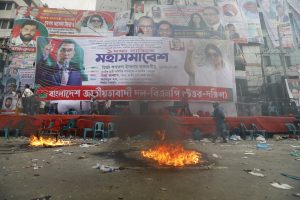On November 16, the Election Commission of Bangladesh announced January 7 as the polling day to elect members to the 12th Parliament of Bangladesh, known as Jatiyo Sangsad. Preparation for the elections, keeping in mind that the main opposition party the Bangladesh Nationalist Party (BNP) may not participate, started much earlier.
On October 23, the government of Bangladesh enacted the Ansar Battalion Bill 2023. Its timing raised eyebrows. The bill empowers the Ansar, a paramilitary auxiliary force, to enter the homes of suspects, arrest, detain, and hand over alleged offenders to the police. For some time it has been speculated that the government will take all necessary steps so as to ensure that it gets re-elected for another five years, which would be a fourth term for the Awami League (AL).
Emphasizing economic achievements during her three-term tenure, Prime Minister Sheikh Hasina has been busy inaugurating several projects in quick succession, among them the Dhaka elevated expressway and the Bangabandhu tunnel under the Karnaphuli River, South Asia’s first under-river tunnel. She also made a show of receiving the first batch of uranium from Russia for the 2400 MW nuclear power plant in Rooppur and attended the soft opening of Terminal 3 of the Hazrat Shahjalal International Airport (HISA) in Dhaka, built by the Japan International Cooperation Agency (JICA). In recent months, Hasina’s government has also inaugurated the Akhaura-Agartala broad-gauge line, Khulna-Mongla Port Rail Line, Padma Bridge Railway Link, MRT Line 6, and Unit II of the Maitri power plant. The purpose was clear: to drive home the point that under Hasina Bangladesh has made immense economic progress.
Yet the AL is still nervous heading into the polls. Hasina said in Parliament that the United States is interested in removing her from power, as the Biden administration has taken a particularly vocal stance on the upcoming elections. In particular, the United States announced it would “impose visa restrictions on Bangladeshi individuals responsible for, or complicit in, undermining the democratic election process in Bangladesh.”
Hasina is suspicious of the United States and its objectives in Bangladesh, and has been since the assassination of her father and other family members in 1975. The threat of visa restrictions has only added to this suspicion, as has the AL’s falling out with Nobel Prize laureate Muhammad Yunus. Hasina believes Yunus’ lobbying with the U.S. led to the cancellation of World Bank funding for the Padma Bridge, one of her administration’s signature infrastructure projects, on the grounds of corruption.
In this context, the massive BNP rally held in Dhaka on October 28 unsettled the AL. After the opposition rally, thousands of activists and leaders were arrested on accusations of being engaged in violence that resulted in the death of a policeman and a BNP leader. Already, the country’s 68 jails have more than 88,000 inmates, almost double their capacity.
None of the parties involved – the AL or the BNP – seems at all concerned that U.S. visa restrictions will focus on political violence, even if it clearly “undermines the democratic election process.” instead, street scuffles remain a go-to staple in the political playbook.

































